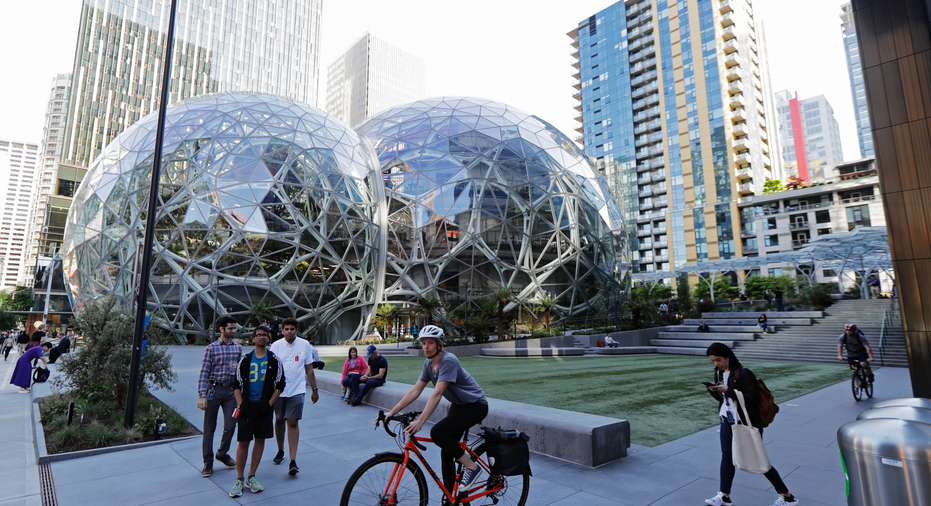Tensions mount as Seattle debates business tax for homeless

SEATTLE – Seattle's latest tax proposal to combat homelessness takes aim at large businesses such as Amazon that have helped drive the city's economic boom.
But the measure has sparked intense debate — even shouting matches in otherwise reserved Seattle — over who should pay to solve the housing crisis exacerbated by that growth.
The City Council is proposing a tax on employee hours to raise about $75 million a year for affordable housing and homelessness services. Nearly 600 large employers making at least $20 million in gross revenues would pay about $500 a year per worker.
Amazon, the city's largest employer, would take the biggest hit.
Supporters insist the online retailer and others that have benefited from Seattle's prosperity and contributed to growing income inequality and skyrocketing rents can and should pay.
Businesses and others say the so-called head tax is misguided and potentially harmful. They question whether the city is effectively using the tens of millions of dollars it already spends on homelessness each year.
Amazon raised the stakes last week when it halted construction planning on a 17-story tower near its hometown headquarters as it awaits a tax vote. It is also rethinking filling office space in another leased building.
The company has more than 45,000 workers, meaning it would pay more than $20 million a year under the tax. It would likely owe even more when the tax switches to a 0.7 percent tax on business payroll in 2021.
Councilwoman Kshama Sawant, a socialist, said affordable housing is critically important and the council should "stand up to Amazon and Jeff Bezos' bullying." Construction workers chanted "no head tax" and disrupted a news conference she held last week on Amazon's campus.
Seattle Mayor Jenny Durkan hasn't taken a position on the tax but said she'll work to find common ground.
The proposal's four sponsors said in a joint statement last week that the tax doesn't target one company, though they noted Amazon's record quarterly profits.
"It seems only fair that as so many struggle to make their way through a tax system that's rigged in favor of large corporations, that we ask those same corporations to financially contribute to the public health and housing solutions designed to address those consequences," they wrote.
A council committee could vote this week and the full council may take it up Monday.
Amazon's threat to pause its expansion in Seattle comes as 20 cities vie to lure the company's second headquarters and as it expands its workforce in Boston and Vancouver, British Columbia. Some see it as a warning to those contenders.
But Jeff Shulman, an associate professor in the University of Washington's Foster School of Business, said he thinks Amazon is more focused on the long term.
"The city is looking at how much Amazon makes and comparing whatever tax to that number, and that could be a scary thought to Amazon," he said, adding: "The $20 million could be viewed as a start, and if Amazon doesn't show it will react now, it can be the start of a slippery slope."
Proponents say people are dying on the streets, and while city-funded programs found homes for 3,400 people last year, the problem deepens. The Seattle region had the third-highest number of homeless people in the U.S. and saw 169 homeless deaths in 2017.
Most money raised would build 1,780 affordable housing units over five years. One-fifth would go toward shelter beds, tiny homes, hygiene, garbage cleanup and other homeless services.
Since 1986, Seattle voters have agreed five separate times to tax themselves to pay for affordable housing. Most recently, they approved a $290 million levy in 2016.
"It's painful and it's embarrassing that we live in a city with so much financial prosperity and so many people without shelter," Lloyd David, executive director of the Polyclinic, a multispecialty medical clinic, told the council at a boisterous City Hall hearing where the council committee chairwoman admonished the chanting crowd and cleared the room at one point.
But David said his clinic has a profit margin of less than 1 percent and would have had an operating loss of almost $500,000 if the tax was in effect this year.
Tom Campanile, CEO of The Essential Baking Company, said the tax would cost his business $250,000 on top of the $250,000 in business taxes and $40,000 in property taxes it already pays. He said his margins are slim, and he can't pass costs on to grocery stores and other customers.
"They're getting taxed, and I'm getting taxed. How much are people willing to pay for local bread? It's going to be more expensive to operate in Seattle," he said in an interview.
While criticized for being slow to contribute, Amazon in recent years donated two buildings on its campus to house the homeless. It also plans to build a shelter for homeless women, children and families within one of its new buildings.
Tensions also boiled over at a recent town hall at a church. Some residents clapped while others jeered and booed when Councilman Mike O'Brien told the crowd, "We designed a tax that we believe is fair."
"All companies that do well and want to partner with our city should have a place here to be prosperous, but that prosperity needs to be shared," he added.
Some residents demanded more accountability and shouted their frustration over what they see is the city's failure to address crime, drug use, camping on sidewalks and in parks, and other problems associated with unauthorized homeless encampments.
"Nobody wants to see people living on the streets. But come up with a viable option," said Jennifer Schuyler, opponent of the tax. "And what are you going to do with the money? Show us a plan."
"We need to do something about this homelessness crisis," said Justin Bare, who favors the tax. "We need to tax them. They need to pay their fair share."



















